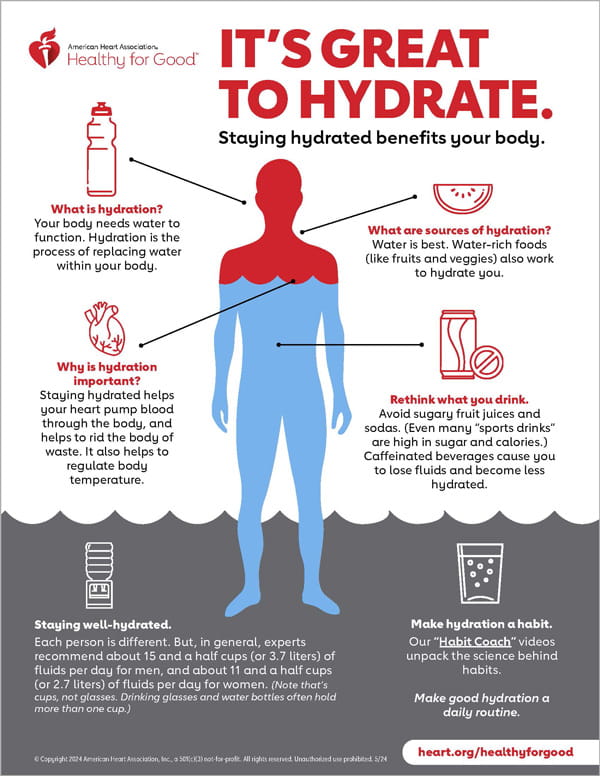The Science of Hydration: How Water Impacts Every Part of Your Body
Published on April 25, 2025 by 5KN Health Team
Introduction
Water is the essence of life, making up about 60% of your body and driving every physiological process. From sharpening your focus to powering your muscles, hydration is the unsung hero of health. Yet, many of us don’t drink enough water, leading to fatigue, poor digestion, and even chronic health issues. In this comprehensive guide, we’ll dive into the science of hydration, exploring how water impacts every part of your body and sharing practical tips to stay hydrated for optimal wellness.

Why Hydration Is Critical for Health
Water is essential for survival, regulating body temperature, transporting nutrients, and flushing toxins. The CDC notes that even mild dehydration—losing just 1–2% of body water—can impair cognitive and physical performance. Chronic dehydration is linked to kidney stones, urinary tract infections, and cardiovascular strain. Understanding hydration’s role helps you prioritize it daily.
The Biology of Water in Your Body
Water is a universal solvent, facilitating chemical reactions in cells. It’s a key component of blood, which carries oxygen and nutrients, and synovial fluid, which lubricates joints. A 2016 study in Frontiers in Nutrition found that adequate hydration supports thermoregulation, digestion, and brain function, underscoring its systemic importance.
How Water Impacts Key Body Systems
Let’s explore how hydration affects specific systems, from your brain to your heart.
1. Brain Function and Cognitive Performance
Your brain is 75% water, and even slight dehydration can cloud your thinking. A 2018 study in Medicine & Science in Sports & Exercise showed that losing 2% of body water impairs memory, attention, and mood. Drinking water restores electrolyte balance, ensuring neurons fire efficiently.
Benefits
- Improves focus and decision-making.
- Reduces headaches caused by dehydration.
- Enhances mood by stabilizing brain chemistry.
Tips
- Keep a water bottle at your desk.
- Pair water intake with mental tasks, like studying.
- Try mindfulness to stay aware of thirst cues (see our meditation guide).
2. Cardiovascular Health
Blood is 90% water, and hydration maintains blood volume and viscosity. Dehydration thickens blood, forcing the heart to work harder, which can raise blood pressure. The American Heart Association links proper hydration to lower cardiovascular risk.
Benefits
- Supports healthy blood pressure.
- Improves circulation and oxygen delivery.
- Reduces risk of heart strain during exercise.
Tips
- Drink water before and after walks (see our walking guide).
- Monitor urine color; pale yellow indicates good hydration.
- Avoid sugary drinks that can dehydrate you.

3. Digestive System
Water aids digestion by breaking down food and absorbing nutrients. It prevents constipation by softening stool and supports gut bacteria. A 2019 study in Nutrients found that hydration improves bowel regularity and reduces gastrointestinal discomfort.
Benefits
- Eases digestion and nutrient absorption.
- Prevents constipation and bloating.
- Supports a healthy gut microbiome.
Tips
- Drink water 30 minutes before meals.
- Eat water-rich foods like cucumbers and oranges (see our superfoods guide).
- Avoid chugging water during meals to aid digestion.
4. Muscle and Joint Performance
Muscles are 75% water, and dehydration reduces strength and endurance. Water lubricates joints, preventing stiffness and injury. A 2017 study in Journal of Strength and Conditioning Research found that dehydrated athletes had 10% lower performance.
Benefits
- Enhances muscle contraction and recovery.
- Reduces joint pain and inflammation.
- Prevents cramps during physical activity.
Tips
- Hydrate before, during, and after exercise.
- Add electrolytes for intense workouts.
- Stretch after drinking water to boost flexibility.
5. Skin Health
Hydration keeps skin hydrated, elastic, and youthful. Dehydration leads to dryness and accelerates aging. A 2020 study in Clinical, Cosmetic and Investigational Dermatology linked adequate water intake to improved skin barrier function.
Benefits
- Reduces dryness and flakiness.
- Flushes toxins for clearer skin.
- Supports collagen production for elasticity.
Tips
- Drink water consistently throughout the day.
- Use a moisturizer to lock in hydration.
- Eat hydrating foods like watermelon.
Watch This Video on Hydration Science
How Much Water Do You Need?
Water needs vary by age, weight, climate, and activity level. The Mayo Clinic recommends 11.5 cups (2.7 liters) for women and 15.5 cups (3.7 liters) for men daily, including water from food. Athletes or those in hot climates may need more.
Personalizing Your Hydration
| Factor | Recommendation |
|---|---|
| Body Weight | Drink 0.5–1 ounce per pound (e.g., 75–150 oz for 150 lbs). |
| Activity Level | Add 12 oz per 30 minutes of exercise. |
| Climate | Increase intake in hot or dry conditions. |
| Health Conditions | Consult a doctor for kidney or heart issues. |
Tips to Stay Hydrated
Making hydration a habit is easy with these strategies:
- Use a Reusable Bottle: Track intake with marked measurements.
- Infuse Your Water: Add lemon, mint, or cucumber for flavor.
- Set Reminders: Use apps or alarms to drink hourly.
- Eat Hydrating Foods: Include fruits and vegetables in meals.
- Start Your Day Right: Drink water first thing in the morning (see our morning hydration guide).

Common Hydration Myths
Let’s debunk myths that confuse hydration efforts:
- Myth: You need exactly 8 glasses daily. Needs vary; listen to your body.
- Myth: All beverages hydrate equally. Sugary or caffeinated drinks can dehydrate.
- Myth: Thirst is the only hydration cue. Fatigue and dark urine also signal dehydration.
Special Considerations
Hydration needs differ for certain groups:
- Pregnant Women: Need extra water for amniotic fluid and blood volume.
- Athletes: Require electrolytes to replace sweat losses.
- Elderly: May have reduced thirst signals; encourage regular sips.
- Medical Conditions: Kidney or heart patients should consult doctors.
Conclusion
Hydration is a cornerstone of health, impacting your brain, heart, digestion, muscles, and skin. By understanding the science and adopting simple habits, you can optimize your water intake and feel your best. Start prioritizing hydration today and explore more health tips on our site to elevate your wellness journey.